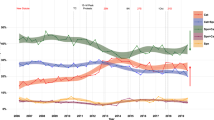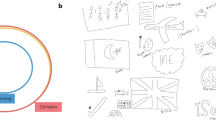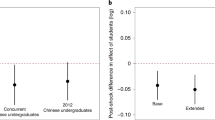Abstract
Nationality governs almost every aspect of our lives, including where we may live and travel, as well as our opportunities for education, healthcare and work. It is a common-sense social category that guides us in making inferences about the social world1,2,3,4. Nationalism has been extensively studied within the social5,6,7,8,9,10,11,12,13,14,15,16 and cognitive sciences17,18,19,20,21,22,23,24,25, but there has been little empirical investigation into folk theories regarding what determines someone’s nationality. In experiments carried out in the United States and India (N = 2,745), we used a variant of the switched-at-birth task26,27,28,29,30,31 to investigate the extent to which people believe that nationality is determined by biology or is a malleable social identity that can be acquired32,33,34. We find that folk theories of nationality seem remarkably flexible. Depending on the framing of the question, people report believing that nationality is either fluid or fixed at birth. Our results demonstrate that people from different cultures with different experiences of migration and different explicit stereotypes of their own nation may share similar folk theories about nationality. Moreover, these theories may shape attitudes towards immigrants—an important public-policy issue35,36,37. Belief that nationality is malleable is associated with more positive attitudes towards immigrants even when holding ideology constant.
This is a preview of subscription content, access via your institution
Access options
Access Nature and 54 other Nature Portfolio journals
Get Nature+, our best-value online-access subscription
$29.99 / 30 days
cancel any time
Subscribe to this journal
Receive 12 digital issues and online access to articles
$119.00 per year
only $9.92 per issue
Buy this article
- Purchase on Springer Link
- Instant access to full article PDF
Prices may be subject to local taxes which are calculated during checkout


Similar content being viewed by others
References
Verdery, K. Whither. ‘nation’ and ‘nationalism’? Daedalus 122, 37–46 (1993).
Billig, M. Banal Nationalism (SAGE, London, 1995).
Brubaker, R. Ethnicity, race, and nationalism. Annu. Rev. Sociol. 35, 21–42 (2009).
Fox, J. E. & Miller-Idriss, C. Everyday nationhood. Ethnicities 8, 536–563 (2008).
Seton-Watson, H. Nations and States: An Enquiry into the Origins of Nations and the Politics of Nationalism (Taylor & Francis, London, 1977).
Phillips, P. D. & Wallerstein, I. National and world identities and the interstate system. Millennium 14, 159–171 (1985).
White, R. Inventing Australia: Images and Identity, 1688-1980 (Allen & Unwin, Sydney, 1981).
Balibar, E. The nation form: history and ideology. Rev. Fed. Am. Health Syst. 13, 329–361 (1990).
Malesevic, S. Nation-States and Nationalisms: Organization, Ideology and Solidarity (Polity, Cambridge, 2013).
Gellner, E. Nations and Nationalism (Cornell Univ. Press, Ithaca, NY, 2008).
Anderson, B. Imagined Communities, rev. edn (Verso, London, 1991).
Hobsbawm, E. J. Nations and Nationalism Since 1780: Programme, Myth, Reality (Cambridge Univ. Press, Cambridge, 2012).
Smith, A. D. Ethno-symbolism and Nationalism: A Cultural Approach (Routledge, New York, NY, 2009).
Brubaker, R. in The State of the Nation: Ernest Gellner and the Theory of Nationalism (ed. Hall, J.) 272–305 (Cambridge Univ. Press, Cambridge, 1998).
Wimmer, A. & Glick Schiller, N. Methodological nationalism and beyond: nation-state building, migration and the social sciences. Glob. Netw. 2, 301–334 (2002).
Connor, W. Ethnonationalism. In The Wiley Blackwell Encyclopedia of Race, Ethnicity, and Nationalism (eds Stone, J. et al.) (John Wiley & Sons, Malden, MA and Oxford, 2015); https://doi.org/10.1002/9781118663202.wberen301
Adorno, T. W., Frenkel-Brunswik, E., Levinson, D. J. & Sanford, R. N. The Authoritarian Personality (Springer, New York, NY, 1950).
Kelman, H. C. in International Politics and Foreign Policy rev. edn (ed. Rosenau, J. N.) 276–288 (Free Press, New York, NY, 1969).
Tajfel, H. Social Identity and Intergroup Relations (Cambridge Univ. Press, Cambridge, 2010).
Kosterman, R. & Feshbach, S. Toward a measure of patriotic and nationalistic attitudes. Polit. Psychol. 10, 257–274 (1989).
Bar-Tal, D. Patriotism as fundamental beliefs of group members. Polit. Individ. 3, 45–62 (1993).
Schatz, R. T., Staub, E. & Lavine, H. On the varieties of national attachment: blind versus constructive patriotism. Polit. Psychol. 20, 151–174 (1999).
Mummendey, A., Klink, A. & Brown, R. Nationalism and patriotism: national identification and out-group rejection. Br. J. Social. Psychol. 40, 159–172 (2001).
Karasawa, M. Patriotism, nationalism, and internationalism among Japanese citizens: an etic–emic approach. Polit. Psychol. 23, 645–666 (2002).
Ditlmann, R. K., Purdie-Vaughns, V. & Eibach, R. P. Heritage- and ideology-based national identities and their implications for immigrant citizen relations in the United States and in Germany. Int. J. Intercult. Relat. 35, 395–405 (2011).
Gelman, S. A. & Wellman, H. M. Insides and essences: early understandings of the non-obvious. Cognition 38, 213–244 (1991).
Gil-White, F. Are ethnic groups biological ‘species’ to the human brain? Curr. Anthropol. 42, 515–553 (2001).
Astuti, R. Are we all natural dualists? A cognitive developmental approach. J. R. Anthropol. Inst. 7, 429–447 (2001).
Ross, N., Medin, D., Coley, J. D. & Atran, S. Cultural and experiential differences in the development of folkbiological induction. Cogn. Dev. 18, 25–47 (2003).
Sperber, D. & Hirschfeld, L. A. The cognitive foundations of cultural stability and diversity. Trends Cogn. Sci. 8, 40–46 (2004).
Kanovsky, M. Essentialism and folksociology: ethnicity again. J. Cogn. Cult. 7, 241–281 (2007).
Brubaker, R., Loveman, M. & Stamatov, P. Ethnicity as cognition. Theory Soc. 33, 31–64 (2004).
Reicher, S. & Hopkins, N. Self and Nation (SAGE, London, 2000).
Zerubavel, E. Social Mindscapes: An Invitation to Cognitive Sociology (Harvard Univ. Press, Cambridge, MA, 2009).
Castles, S., de Haas, H. & Miller, M. J. The Age of Migration: International Population Movements in the Modern World (Palgrave Macmillan, New York, NY, 2013).
International Migration and Development: Report of the Secretary-General UN A/71/296 (United Nations, 2016).
Richerson, P. J. & Boyd, R. Being human: Migration: An engine for social change. Nature 456, 456877a (2008).
Allport, G. W. The Nature of Prejudice (Addison, New York, NY, 1954).
Barth, F. Ethnic Groups and Boundaries: The Social Organization of Culture Difference (Universitetsforlaget, Bergen, 1969).
Foucault, M. Discipline and Punish: The Birth of the Prison (Vintage Books, New York, NY, 1975).
Bauman, Z. Soil, blood and identity. Sociol. Rev. 40, 675–701 (1992).
Fox, J. E. & Miller-Idriss, C. The ‘here and now’ of everyday nationhood. Ethnicities 8, 573–576 (2008).
Rousseau, J. J. Emile (trans. Foxley, B.) (Original work published 1762) (Dent, London, 1974).
Herder, J. G. Spirit of Hebrew Poetry Vol. 1 & 2 (trans. Marsh, J.) (Edward Smith, Burlington, VT, 1833).
Renan, J. E. What is a Nation? (Routledge, London, 1990).
Luxemburg, R. The National Question: Selected Writings by Rosa Luxemburg (NYU Press, New York, NY, 1908).
Nietzsche, F. Beyond Good and Evil (Penguin, London, 2003).
Schildkraut, D. J. Americanism in the Twenty-First Century: Public Opinion in the Age of Immigration (Cambridge Univ. Press, New York, NY, 2010).
Kristeva, J. Nations Without Nationalism (Columbia Univ. Press, New York, NY, 1993).
Ignatieff, M. Blood and Belonging: Journeys into the New Nationalism (Random House, New York, NY, 2010).
Wimmer, A. Ethnic Boundary Making: Institutions, Power, Networks. (Oxford Univ. Press, Oxford, 2013).
Net migration (World Bank, accessed 14 November 2017); https://data.worldbank.org/indicator/SM.POP.NETM
WVS World values survey. Wave 5, 2005–2008 (2005).
Devos, T. & Banaji, M. R. American=white? J. Pers. Soc. Psychol. 88, 447 (2005).
Esses, V. M., Dovidio, J. F., Jackson, L. M. & Armstrong, T. L. The immigration dilemma: the role of perceived group competition, ethnic prejudice, and national identity. J. Soc. Issues 57, 389–412 (2001).
Boyd, R. & Richerson, P. J. Voting with your feet: payoff biased migration and the evolution of group beneficial behavior. J. Theor. Biol. 257, 331–339 (2009).
Henrich, J. Cultural group selection, coevolutionary processes and large-scale cooperation. J. Econ. Behav. Organ. 53, 3–35 (2004).
Alexander, R. The Biology of Moral Systems (Routledge, New York, NY, 2017).
Geertz, C. Old Societies and New States: The Quest for Modernity in Asia and Africa (Free Press of Glencoe: New York, NY, 1963).
Medin, D. L. Concepts and conceptual structure. Am. Psychol. 44, 1469–1481 (1989).
Atran, S. Folk biology and the anthropology of science: cognitive universals and cultural particulars. Behav. Brain Sci. 21, 547–609 (1998).
Medin, D. L. & Atran, S. Folkbiology (MIT Press, Cambridge, MA, 1999).
Henrich, J. The Secret of our Success: How Culture is Driving Human Evolution, Domesticating our Species, and Making us Smarter (Princeton Univ. Press, Princeton, NJ, 2015).
Clark Barrett, H. On the functional orgins of essentialism. Mind Soc. 2, 1–30 (2001).
Banton, M. Modelling ethnic and national relations. Ethn. Racial Stud. 17, 1–19 (1994).
Nagel, J. Constructing ethnicity: creating and recreating ethnic identity and culture. Soc. Probl. 41, 152–176 (1994).
Okamura, J. Y. Situational ethnicity. Ethn. Racial Stud. 4, 452–465 (1981).
Horowitz, A. L. Ethnic identity. In The Wiley-Blackwell Encyclopedia of Globalization (ed. Ritzer, G.) (John Wiley & Sons, Hoboken, NJ, 1975); https://doi.org/10.1002/9780470670590.wbeog602
Chatterjee, P. The Nation and its Fragments: Colonial and Postcolonial Histories (Princeton Univ. Press, Princeton, NJ, 1993).
Acknowledgements
This research was funded by a grant to J.G. from the US National Science Foundation (SES 1559387). We thank D. Medin, S. Atran, L. Hirschfeld, W. Hirst and J. Miller for their feedback during the research, and K. A. Lee, C. Shackleford and J. Smith for research assistance. The funders had no role in the study design, data collection and analysis, decision to publish or preparation of the manuscript.
Author information
Authors and Affiliations
Contributions
M.S.R. and J.G. conceived the presented idea. Both authors developed the theory, planned and carried out the data collection, performed the computations, verified the analytical methods, discussed the results and contributed to the final manuscript.
Corresponding author
Ethics declarations
Competing interests
The authors declare no competing interests.
Additional information
Publisher’s note: Springer Nature remains neutral with regard to jurisdictional claims in published maps and institutional affiliations.
Supplementary information
Supplementary Information
Supplementary Methods, Supplementary Discussion, Supplementary References
Supplementary Data 1
The complete dataset of all studies in CSV format (2,745 rows and 13 variables)
Supplementary Data 2
The dataset for the supplementary experiment in Supplementary Section 2.3
Rights and permissions
About this article
Cite this article
Rad, M.S., Ginges, J. Folk theories of nationality and anti-immigrant attitudes. Nat Hum Behav 2, 343–347 (2018). https://doi.org/10.1038/s41562-018-0334-3
Received:
Accepted:
Published:
Issue Date:
DOI: https://doi.org/10.1038/s41562-018-0334-3



